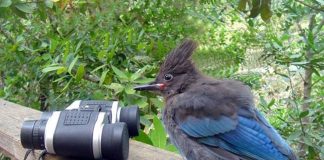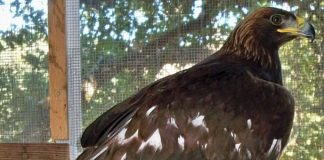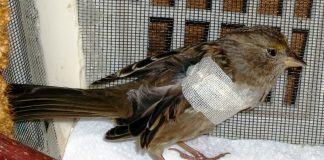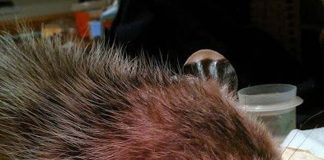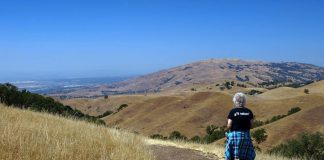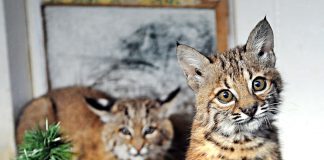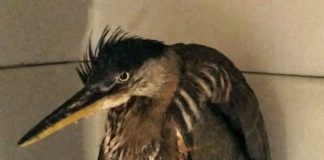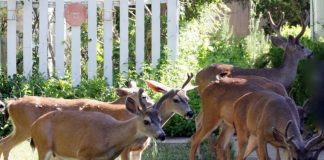Last month's column summarized the results of Audubon's seven-year study on the effect of climate change and habitat loss on birds. The report was written by well-known scientists, but these highly regarded scientists could not have compiled all the data on bird locations and movements by themselves—such a task would be overwhelming. Where did Audubon's scientists get the data needed to complete this study?
For most of us, autumn is the time of year we shake off the lazy days of summer and get down to the serious business of food. Resourceful folks are canning their autumn harvests of pumpkins, pears, persimmons and peppers. People are busily preparing days ahead for sumptuous holiday feasts to share with their families and friends.
I am enjoying my morning coffee when I hear a sickening thud and the sound of something lightly sliding down the kitchen window. The window shakes ever so slightly. Before I can even look up from my newspaper, I realize a bird has struck the window. Looking outside, I see a trembling, dazed mockingbird on the walkway below. Fortunately, he is on his feet. I watch him for a few minutes to be sure none of my neighbor's cats, who claim my yard as their own, find him. In a few minutes, thankfully, he is airborne again—hopefully wiser about windows and no worse for wear.
To paraphrase Hamlet, the young opossum literally suffered the slings and arrows of outrageous (mis)fortune. It was walking along the top of a fence just minding its own business, perhaps looking for an evening meal of fallen fruit or crunchy snails, when a person deliberately shot it down with an arrow. A neighbor saw the poor creature desperately struggling and notified the Wildlife Education and Rehabilitation Center. Staff at WERC found the arrow had pierced the top of the front leg and through the chest, narrowly missing vital organs, but leaving him extremely weak and causing severe nerve damage in the leg. X-rays showed the humerus bone was shattered. It was with very sad hearts that this little opossum was euthanized.
Virginia Holtz grew up in Washington State and at a young age lived in a log house in a state park not far from Seattle. Her father was the caretaker of the park and her grandparents were farmers. Holtz’s childhood was spent outdoors; she recalls seeing the local Native Americans fishing for eels and watching tadpoles grow legs and become frogs. When she married and moved to Santa Clara County in 1979, she was shocked at the rapid, unplanned development going on all around her. In contrast, people in Washington seemed to place a high priority on open space, parks, lakes and farmland.
WERC, the Wildlife Education and Rehabilitation Center of Morgan Hill, is celebrating 20 years of successfully raising and releasing orphaned or injured bobcat kittens back to their native habitat using innovative and life-saving techniques.
You have just discovered that a mother raccoon has given birth to five adorable black-masked cubs in the crawl space under your house. Much as you love wild animals, you don't want them living with you, and you know raccoon feces contain a parasite that causes serious illness in humans. So you go to the nearest pet products store, buy or rent a humane trap, bait it and soon mama is corralled. You scoop up the babies, carefully load the trap and raccoons into your car and drive out to the nearest park or reservoir, where you release the raccoon family. Problem solved, right?
In June, a boating inspector named Patricia came across a young great blue heron in the middle of the road at Coyote Lake-Harvey Bear Ranch County Park in San Martin. The bird couldn't fly but was trying to hop across the road to get up an embankment. Concerned that it might get hit by a vehicle, Patricia brought the bird to the ranger station. Park ranger Seth Topping, who just happens to be a former WERC volunteer, contacted the Wildlife Education and Rehabilitation Center for advice on evaluating whether the bird needed to be rescued or should be returned to the lake. Because its attempts to strike and defend itself were slow and off the mark, Topping determined that it was probably too young or too malnourished to live if released. Patricia transported it to WERC.
Red-winged blackbirds in an oak forest? Gray foxes lounging on a backyard deck? Duck families bobbing in your swimming pool? An influx of seemingly abandoned fawns near homes and businesses?


